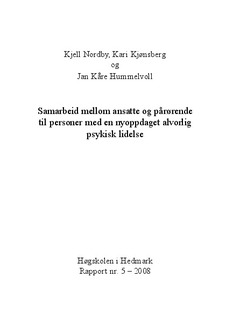Samarbeid mellom ansatte og pårørende til personer med en nyoppdaget alvorlig psykisk lidelse
Research report
Permanent lenke
http://hdl.handle.net/11250/133786Utgivelsesdato
2008Metadata
Vis full innførselSamlinger
Sammendrag
Norsk: Denne studien er fase 2 i prosjektet: «Samarbeid mellom ansatte
og pårørende til personer med en nyoppdaget alvorlig psykisk lidelse». Studien er
et samarbeid mellom Divisjon psykiske helsevern, Avdeling for psykosebehandling
og rehabilitering og Høgskolen i Hedmark, Avdeling for helse- og idrettsfag.
Gjennomføringen skjer innen Seksjon for utredning, diagnostisering og behandling,
som gir et tilbud til unge mennesker med psykoselidelse. Hovdemål: Bygge
opp et tilbud, basert på vitenskapelig kunnskap og praksisbasert evidens, som
pårørende til de unge med en nyoppdaget psykoselidelse opplever møter deres
behov og ønsker. English: This study is part of the research project: «Collaboration between staff
and relatives to persons with recently discovered serious mental illness». The study
is a collaboration between Innlandet Hospital Trust, Division of Mental Health Care,
Department of Psychosis Treatment and Rehabilitation and Hedmark University
College, Faculty of Health and Sports. The study is carried out in: Section of assessment,
diagnosing and treatment. Main objective of the study: To develop a service,
based on scientific knowledge and practice based evidence, which meets the needs of
relatives to young people with recently discovered serious mental illness.
The overall design is co-operative inquiry. The present study is considered as phase
2 (2005–2007) of a larger study. It is based on data from phase 1 (2003–2005): Qualitative
research interviews with 24 relatives (19 parents and 5 adult siblings) (Nordby
& Kjønsberg, 2005). Methods used in phase 2: eight focus group interviews (one
with a group of parents and one interview with professionals in each of the four
participating units and three with mixed groups of relatives and staff), dialogue based
teaching lessons, deliberation meetings, document analysis and a postenquete
among relatives). Data were analysed by means of qualitative content analysis and
descriptive analyses.
Results indicate some changes in practice and procedures which regulate the cooperation
between relatives and professionals. The changes vary in the four units
depending on the focus of development. The changes are manifested by the relatives
entering earlier into collaboration with the staff, and that support is secured to
relatives when the patient is transferred to another unit. There is more focus on and
support to siblings. Still the units need to focus on siblings to get them included. One
of the units has changed the distribution of responsibility among the staff to secure
continuity early in the collaboration process with the relatives. One unit has introduced an agenda to the relatives before formal meetings to clarify
the aim of the meeting and to reduce insecurity among the relatives. During eight
focus group interviews, dialogue based teaching sessions, deliberation meetings and
a postenquete some essential conceptions have emerged as important to good quality
cooperation between relatives and staff: Encounter, hope, giving and receiving information,
roles and support and guidance. The siblings have brought into focus the
importance of viewing the patient as a whole person. In the focus group interview
both relatives and staff underline the importance of imparting hope. 63 % of relatives
experienced this in «large degree» or «very large degree». Only 7 % (two relatives)
answered in «little degree».
An evaluation of methods used in this research project judge the design of co-operative
inquiry as a relevant strategy in future development in health care practice,
though continuity of the project and information to staff should be more focused and
taken care of.
Serie
Rapport05/2008
